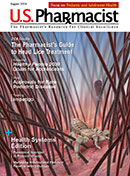In a recent study in the New England Journal of Medicine, researchers noted that the use of low-dose aspirin was linked to lower rates of HCC and 10-year liver-related mortality among patients with HBV or HCV. The purpose of this study was to ascertain the relationship between low-dose aspirin use and HCC, liver-related mortality, and bleeding risks among patients with chronic HBV or HCV infection.
The study included 50,275 adults from the nationwide Swedish Registry for Surveillance of Communicable Diseases with chronic HBV or HCV infection between 2005 and 2015 who did not have a prior history of aspirin use. Of these patients, 14,205 were identified as initiating low-dose aspirin based on their first filled prescription of at least 90 consecutive doses of aspirin, which had to occur 180 days after their diagnosis of HBV or HCV infection. Among these patients, 84% filled subsequent aspirin prescriptions. Nonaspirin users were considered those who did not fill an aspirin prescription. In Sweden, low-dose aspirin is available by prescription only. Patients with HIV, prior HCC, or prior filled prescriptions of aspirin or other antiplatelet agents before the 180-day period were excluded from the analysis.
The study revealed that with a median of 7.9 years of follow-up, the estimated cumulative incidence of HCC was 4.0% among aspirin users and 8.3% among nonusers of aspirin (difference, –4.3 percentage points; 95% confidence interval [CI], –5.0 to –3.6; adjusted hazard ratio, 0.69; 95% CI, 0.62 to 0.76).
In addition, the study found that this inverse association appeared to be duration-dependent compared with short-term use (3 months to less than 1 year). The adjusted hazard ratios were 0.90 (95% CI, 0.76-1.06) for 1 to less than 3 years of use, 0.66 (95% CI, 0.56-0.78) for 3 to less than 5 years of use, and 0.57 (95% CI, 0.42-0.70) for 5 or more years of use.
Ten-year liver-related mortality was 11.0% among aspirin users and 17.9% among nonusers (difference, –6.9 percentage points [95% CI, –8.1 to –5.7]; adjusted hazard ratio, 0.73 [95% CI, 0.67-0.81]). However, the 10-year risk of gastrointestinal bleeding did not differ significantly between users and nonusers of aspirin (7.8% and 6.9%, respectively; difference, 0.9 percentage points; 95% CI, –0.6 to 2.4).
The researchers concluded that in a nationwide study of patients with chronic viral hepatitis in Sweden, the use of low-dose aspirin was linked to a considerably lesser risk of HCC and lower liver-related mortality than no use of aspirin, without a significantly higher risk of gastrointestinal bleeding. The authors noted that these findings support the need for randomized clinical trials that are designed to evaluate the benefits of aspirin for primary prevention of HCC.





